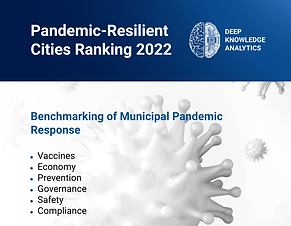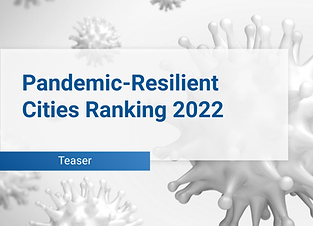
Pandemic-Resilient Cities Ranking 2022
Benchmarking of Municipal Pandemic Response
(Vaccines, Economy, Prevention, Governance, Safety, Compliance)
Based on data collected until the 15th of June 2022
This special analytical case study is conducted by Deep Knowledge Analytics, the DeepTech analytical subsidiary of Deep Knowledge Group, which specializes in producing advanced analytics using sophisticated technologies to provide insightful market intelligence and pragmatic forecasts.
The primary focus of the report is to analyze the regional response to pandemics at the municipal level. This publication is the second iteration of an ongoing and annually updated series of the city-level COVID 19 pandemic response analysis.
In addition to the municipal response to pandemics, the Ranking examines several contextual factors to ensure the economy is stabilized during emergencies, competently manages internal health system resources, and identifies risks, and prevents them. The Ranking is expected to provide insights into leadership and the economy, society, and health, as well as assist municipalities and states in determining gaps in their preparedness measures to achieve inclusion, resilience, and sustainability in cities through the independent analysis.
141
INDICATORS
6
PARAMETERS
100
CITIES
14,000+
DATA POINTS
About the Parameters
By releasing an assessment of national and municipal responses to the constant changes created by the COVID-19 crisis on an annual basis, the Pandemic-Resilient Cities Ranking aims to evaluate continued progress and generate additional policy recommendations to fill identified gaps. There are six key areas that city governments should focus on in order to prevent the spread of COVID-19 and to stay resilient to and prepared for events of similar biological threats – government efficiency, economy stability (resilience), healthcare management, quarantine measures efficiency, vaccination strategy, and cultural compliance.
Since the release of the 2021 ranking, and by the middle of the 2022 ranking research period, an additional 28 cities have been examined and added to the overall ranking, and 72 cities remained the same. Among those analysed previously, some municipalities, such as Ottawa, Tokyo, Auckland, Madrid, Oslo, made advances through the policies they have implemented and have shown an increase in their overall scores. Others, such as London, Berlin, Tel Aviv-Yafo, and Hong Kong, have shown a decrease in their score.
The course of pandemic has shown that besides quality of coordination among government levels, other factors such as quality of leadership, legitimacy, credibility, and trust in government have shown to improve or worsen the outcome of coordination efforts. It has been observed that regardless of development level and quality of governance, large countries have had a harder time to contain the virus than smaller countries. Almost all countries have implemented fiscal support programmes since COVID-19 hit, with significant diversity in composition and volume of these fiscal stimulation programmes. The distributional outcomes of the pandemic have been uneven: the plague substantially increased inequality gaps with negative consequences for people in vulnerable conditions and their economic, social, and physical well-being.
Many countries implemented a number of nonpharmaceutical interventions to control the spread of the virus; however, recent evidence suggest that given devastating costs of lockdowns, there was no negative correlation between the degree of lockdown measures and COVID-19 fatality. Currently governments are lifting restrictions based on the fact that vaccines provide good level of protection from the virus. When treated as an endemic, COVID-19 will no longer be a health emergency, so restrictions may no longer be mandatory, which will allow health officials to contain the diseases with less disruptions and costs for the public.
The examples of strengthening resilience in cities’ healthcare systems include advances in telehealth, balanced care between patients with COVID-19 and other comorbidities, new facilities, protocols, and support of the private healthcare system for additional financial and human resources. When it comes to vaccination rate, the study shows that as of now, the model of global vaccine distribution is based on financial competition for limited vaccine supplies: wealthier countries have been able to respond to the threat of the virus by securing enough doses while poorer countries are being forced to rely on voluntary donations through schemes like COVAX.
The pandemic has granted a great chance to study how individualism/collectivism influences the trajectory of a pandemic. Research shows that the value connected with individualism can exacerbate the spread and severity of COVID-19 through absence of social cooperation and policy.
COVID-19 Municipal Pandemic Response: Top 50 Cities
Pandemic-Resilient Cities Ranking 2022: Top 10 City Profiles
Data on World Map
Concluding Remarks
Humanity has never been at a more crucial moment with regards to our health and well-being. Another winter of COVID-19 is coming, but what does the future hold? Having faced the staggering losses from COVID-19, global and national leaders are now obliged to enhance new resilience capacities, serving their people beyond the current pandemic. As COVID-19 still spreads, stressing health systems, creating disruption, and exhausting government budgets and social protection, it certainly is not the last global health emergency the world is facing. Climate change, biotechnological advances, urbanisation, and threats from deliberately engineered bioweapons will increase the risk of future, more frequent pandemics.
About Us

Deep Knowledge Analytics is a DeepTech focused agency producing advanced analytics on DeepTech and frontier-technology industries using sophisticated multi-dimensional frameworks and algorithmic methods that combine hundreds of specially-designed and specifically-weighted metrics and parameters to deliver insightful market intelligence, pragmatic forecasting and tangible industry benchmarking.
It is an analytical subsidiary of Deep Knowledge Group, an international consortium of commercial and non-profit organizations focused on the synergetic convergence of DeepTech and Frontier Technologies (AI, Longevity, MedTech, FinTech, GovTech), applying progressive data-driven Invest-Tech solutions with a long-term strategic focus on AI in Healthcare, Longevity and Precision Health, and aiming to achieve positive impact through the support of progressive technologies for the benefit of humanity via scientific research, investment, entrepreneurship, analytics and philanthropy.
Deep Knowledge Analytics can engage with strategic partners via several different approaches, including:
-
Conduct customised case studies, research and analytics for internal (organizational) use, tailored to the precise needs of specific clients;
-
Production of analytical reports for open source use (freely accessible);
-
Perform customised solutions using specialised software, industry and technology databases, interactive IT-platforms.
For further information on Contact Us





